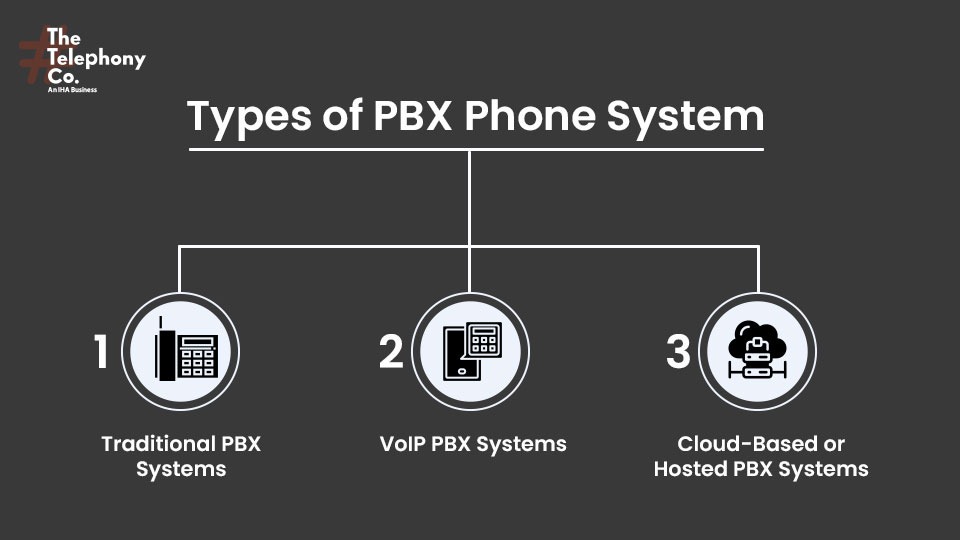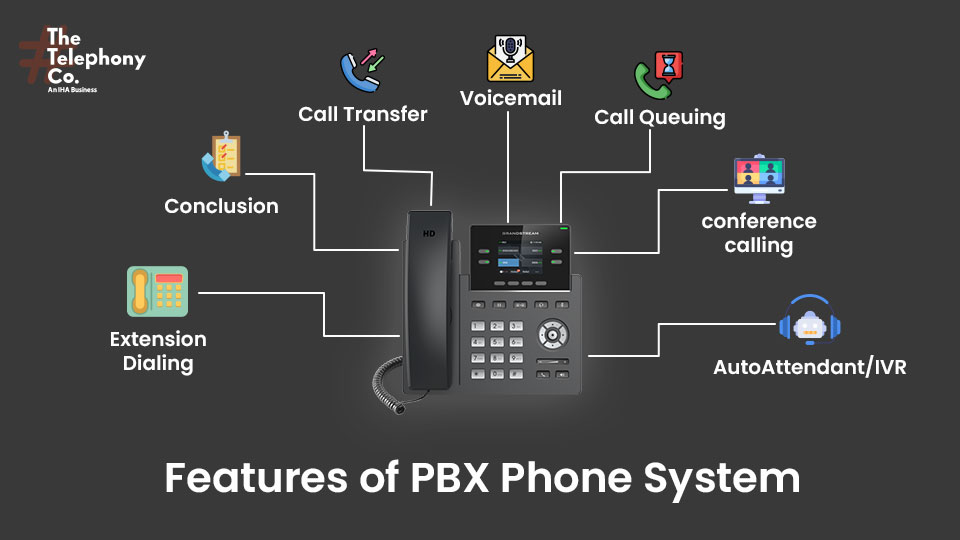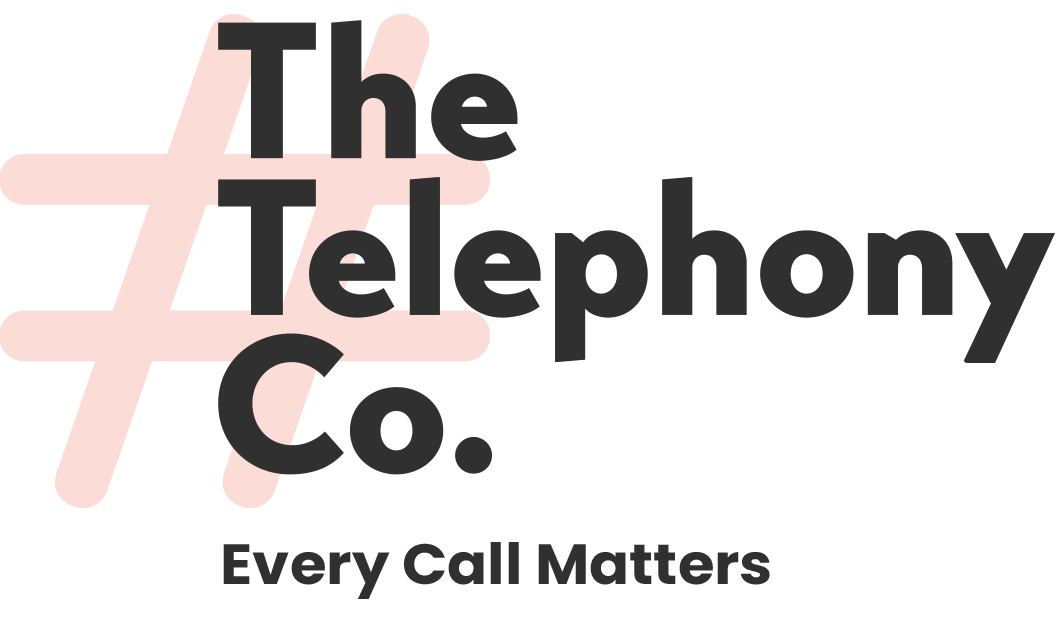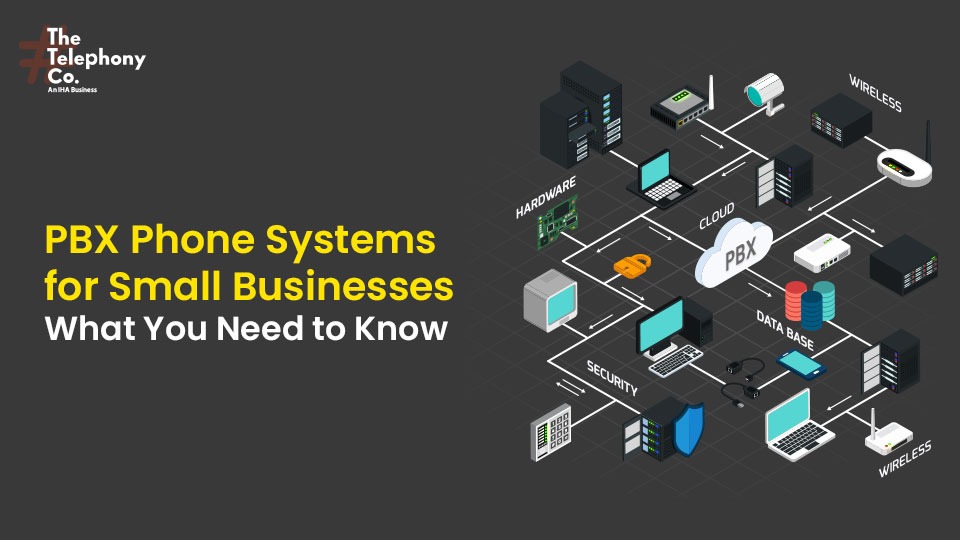PBX Phone System for Small Business is not only an effective communication but essential in today’s constantly changing and interconnected business environment and also a competitive advantage. The Private Branch Exchange (PBX) system, an advanced telephony solution essential to enabling seamless connectivity both within and outside of businesses, is the hub of this communication infrastructure. In this comprehensive guide, we’ll go deeper into the fundamentals of PBX Phone Systems, look into their many varieties, and explain their enormous importance in today’s business operations
What Is a PBX Phone System?
A PBX (Private Branch Exchange) phone system is a private telephone network used within a company that allows employees to communicate internally and externally. PBX systems manage inbound calls and outbound calls, including features like call routing, voicemail, auto-attendants, and conference calls. For small businesses, a PBX system ensures professional communication while streamlining operations and reducing costs.
Types of PBX Systems for Small Businesses

There are mainly three types of PBX phone systems that provide for different business needs.
Traditional PBX
Traditional PBX systems are on-premises setups that require physical hardware to connect phone lines within the office. While these systems offer reliability, they are generally more expensive due to hardware costs, installation, and maintenance.
Hosted PBX (Cloud PBX)
Hosted PBX systems are manage off-site by a third-party provider. There is no need for physical hardware to be present because these systems run completely online. They operate in the cloud, meaning you won’t need to invest in expensive equipment or deal with maintenance. Hosted PBX systems are particularly cost-effective for small businesses since they are scalable and offer flexibility.
VoIP PBX
VoIP (Voice over Internet Protocol) PBX systems use the internet to make and receive calls. Its Phone systems are growing in popularity due to their affordability, ease of installation, and low maintenance. They are highly flexible, allowing businesses to make calls from any device connected to the internet.
Key Benefits of PBX Phone System for Small Business
Contact us for a Free Consultation Today
Transform your small business communication with affordable PBX phone systems
Cost Saving
Compared to traditional phone systems, PBX systems provide great cost savings by combining communication tools and using the internet. Hosted PBX solutions reduce maintenance expenses and eliminate the need for upfront hardware, making them a highly affordable option for businesses of any size.
Improved Customer Engagement
Providing outstanding customer service requires effective call routing and handling, and PBX systems shine in this area. Customers’ overall experience and satisfaction are improved by features like automated call distribution (ACD) and interactive voice response (IVR). Which guarantees that they are quickly connected to the appropriate department or representative.
Flexibility and Scalability
PBX systems provide the flexibility and scalability to easily adapt to changing business needs. You can fast add new extensions, connect mobile devices, or expand across multiple locations. This built-in scalability allows organizations to grow and develop without being limited by outdated communication systems.
Better Staff Communication
A PBX phone system greatly improves staff communication in the workplace. With features like call forwarding, conferencing, and extension dialing, it allows team members to connect easily, whether they are in the office or working remotely.
Features to Look for in an Budget Friendly PBX Phone Systems for Small Businesses

When selecting a Budget Friendly PBX (Private Branch Exchange) system for your small business, it’s important to choose one that meets your specific communication needs. A good PBX system can enhance the way your business handles calls, improve customer service, and increase overall productivity. Here are some essential features to consider when evaluating different PBX systems:
Call Routing and Forwarding
Call routing and forwarding is a key feature that ensures incoming calls are directed to the right employee or department. This means that customers can quickly reach the person they need without being transferred take times.
Voicemail to Email
Voicemail to email functionality is another useful feature for small businesses. With this feature, voicemail messages are sent directly to your email inbox. This allows employees to listen to voicemails at their convenience, even when they are away from their desk. Additionally, it makes it easier to keep track of important messages and ensures that no important communication is missed, no matter where you are.
Auto-Attendant
An auto-attendant is an automated system that provides a professional greeting to callers and routes calls to the appropriate extensions. This feature can give your business a more polished image by ensuring that every call is answered professionally. With an auto-attendant, callers can select options from a menu (e.g., “Press 1 for Sales, Press 2 for Support”), which helps them reach the right department quickly and efficiently. This improves the overall customer experience by reducing wait times.
Conference Calling
Conference calling capabilities enable multiple participants to join a single call, making it ideal for team meetings, client discussions, or collaborative projects.
Mobile Integration
Today is mobile world having the ability for employees to make and receive calls from their mobile. Mobile integration allows staff to use their business phone number on their smartphones, which is particularly beneficial for employees who work remotely or are often on the go.
Call Analytics
Call analytics is a very powerful tool that provides insights into call volume, duration, and other important metrics. With this feature, businesses can track how many calls are being made, the average duration of calls, and peak calling times.
Step-by-Step Guide to Choosing the Right PBX System
Selecting the right PBX system for your small business can be overwhelming. Follow these steps to make the right choice:
Clarify Your Business Needs
Start by analyzing how many employees will use the system, the number of phone lines you need, and the type of features required (e.g., call forwarding, voicemail, auto-attendant).
Set a Budget
Calculate how much your business can afford to spend on a PBX system, including both setup costs and monthly fees.
Consider Scalability
Ensure that the PBX system can grow with your business. Cloud and VoIP systems are typically more flexible and scalable than traditional systems.
Telephony Providers
Look for reputable PBX providers (The Telephony Co) that specialize in small businesses. Compare their pricing, features, and customer reviews.
Test the System
Many PBX providers offer free trials or demos. Take advantage of these to test the system and see if it meets your business’s needs.
Check Customer Support
Ensure that the provider offers reliable customer support in case you run into any issues.
How to Set Up a PBX Phone System
Once you’ve chosen the best PBX phone system provider, follow these steps to set up your system:
- Select a Plan: Choose the plan that fits your budget and business needs.
- Install Necessary Hardware: For traditional systems, you’ll need to install phone lines and hardware. Cloud telephony and VoIP phone systems only require an internet connection and compatible devices.
- Configure the System: Work with your provider to set up call routing, voicemail, and other features.
- Train Employees: Ensure that your staff understands how to use the system and its features.
- Monitor and Optimize: Use call analytics to monitor performance and make adjustments as needed.
Top 5 Budget Friendly PBX Phone System for Small Business Provider
The Telephony Co, Best PBX Phone System for Small Business
The Telephony Co provide customizable PBX solutions specifically tailored for small businesses, ensuring flexibility and scalability.
Features:
- Customizable Solutions: Tailor the PBX system to meet the unique needs of your business.
- Flexible Pricing: Offers various pricing plans to accommodate different budgets and requirements.
- Robust Customer Support: Known for excellent customer service to assist businesses with their telephony needs.
RingCentral
RingCentral is a leading cloud-based PBX provider known for its versatility and range of plans tailored to different business needs.
Features:
- Call Forwarding: Easily direct incoming calls to the right employees or departments.
- Voicemail: Access voicemails through the mobile app or email, ensuring no important messages are missed.
- Mobile Integration: Make and receive calls from mobile devices using the business number, providing flexibility for remote work.
Grasshopper
Grasshopper offers a VoIP-based system specifically designed for small businesses, focusing on affordability and ease of use.
Features:
- Virtual Phone Numbers: Provides dedicated business phone numbers that enhance professionalism.
- Call Management: Features like call screening and call forwarding help manage incoming calls efficiently.
- Mobile App: Users can manage calls and messages directly from their smartphones.
Nextiva
Nextiva is an affordable hosted PBX provider that emphasizes reliability and robust features.
Features:
- Call Analytics: Gain insights into call volume and patterns to improve communication strategies.
- Conference Calling: Enable seamless collaboration with built-in conference call features for team meetings.
- Reliable Customer Support: Offers 24/7 support to address any issues promptly.
8×8
8×8 is recognized for its competitive pricing and comprehensive features in a cloud-based PBX solution.
Features:
- Global Calling: Connect with customers and partners worldwide at competitive rates.
- Mobile Apps: Empower employees to stay connected through dedicated mobile applications.
- Advanced Analytics: Access detailed call metrics to assess and enhance communication performance.
Why Choose The Telephony Co PBX Phone System for small business
The Telephony Co offers the best PBX phone system for small business that is carefully developed to improve every aspect of your business communication, bringing a wealth of experience to the table. Our extensive service portfolio serves companies of all kinds, from start-ups looking for simplified connectivity to well-established firms in need of expandable options. As your dependable partner, The Telephony Co gives you access to modern technology supported by a group of passionate experts who are all invested in your success.
We at The Telephony Co recognize that successful interaction is essential to any kind of business. For this reason, we go above and beyond to offer customized PBX solutions that precisely match your particular needs and objectives. Our PBX systems enable your team to work smarter, not harder, with features like advanced collaboration and seamless call routing. Find the difference with The Telephony Co and transform the way you interact, work together,
Conclusion
PBX phone systems provide a cost-saving, flexible, and professional way for small businesses to improve communication. You can choose between traditional, hosted, or VoIP PBX systems based on your business’s specific needs and budget. These systems come with features that help streamline operations and enhance customer service. Investing in an cost saving PBX system is smart, as it can easily grow with your business.
Can I integrate my PBX system with other business tools?
Yes, many modern PBX systems offer integration with customer relationship management (CRM) software, email systems, and other business applications, streamlining communication and improving workflow.
Do I need an IT team to manage a PBX phone system?
Not necessarily. Hosted PBX systems are managed by service providers, reducing the need for in-house IT support. However, traditional and IP PBX systems may require some technical assistance for installation and maintenance.
How much does a PBX phone system cost for a small business?
Costs vary based on the type of PBX system, number of users, and features required. Traditional systems may have higher upfront costs for hardware, while hosted PBX systems often operate on a subscription model with lower initial investments.
What are the different types of PBX systems available for small businesses?
The main types of PBX systems are Traditional PBX (on-premises), Hosted PBX (cloud-based), and VoIP PBX (internet-based). Each type offers different levels of flexibility and cost-effectiveness.

